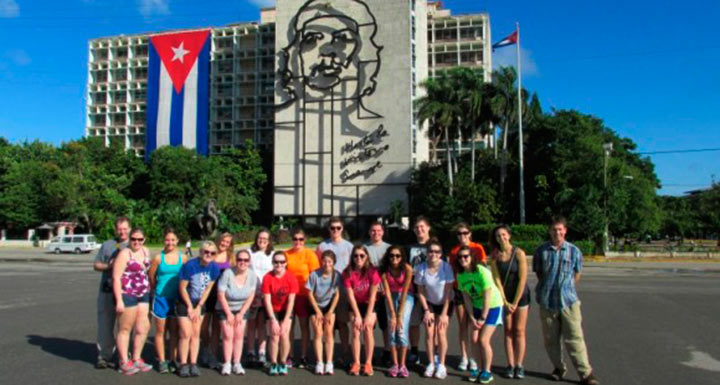
Hypocrisy and the right to travel to Cuba
Political hypocrisy and cynicism are cancers on the body politics. Most people don’t realize the damage they are doing until it is too late. When elected officials set different standards for themselves while advocating policies that limit the constitutional rights of Americans, the credibility of the political system suffers and the political capital of democratic institutions erodes.
The case of staffers for Senator Rubio and Congresswoman Ros-Lehtinen travelling to China on a trip hosted by the Chinese communist party-state is a painful example. For decades, Cuban-American legislators have fiercely opposed travel to Cuba and reprimanded any colleague who went to Cuba or sent staffers on a fact finding mission or to talk with the government. Rubio and Ros-Lehtinen made the issue of not traveling to communist countries and not giving a dime to the coffers of non-democratic regimes a test of fidelity to human rights. Rubio has often said on the Senate that every dollar spent on a trip to a communist country goes directly to fund repression; every dollar except those spent by his staff on their state-sponsored China junket.
It is at such times of exposed hypocrisy, when leaders must take sides and make clear what our democratic principles are. Integrity differentiates those who predicate their anti-Castro policies on violating Americans’ right to travel, while they travel to China, and those who believe that American travelers are-as Hillary Clinton put it- “walking advertisements” for the benefits of an open society and American democracy, in Cuba and in China.
Yet, when hypocrites like Senator Rubio and Congresswoman Ros-Lehtinen aggressively questioned the morality and logic of the White House’s decisions to restore family travel and expand remittances to Cuba the Obama administration all too often reacted shyly or not at all. Obama’s officials seem to forget the president’s own discourse about the importance of engaging with Cuban civil society and updating a policy conceived before he was even born.
Many Cuban Americans who voted for President Obama twice are disappointed because the president gives too much to pro-embargo politicians and listens too little to those who defend his promises of a new policy based on dialogue and communication with Cuba. After his reelection in 2012, winning a majority of Cuban Americans who supported his travel reforms, Secretary Clinton advised President Obama to “take another look at our embargo. It wasn’t achieving its goals, and it was holding back our broader agenda across Latin America”. Has he done so?
Today, it is easier for a Cuban citizen living under a communist government to travel to the United States than for an American citizen who lives in democracy to travel freely to Cuba. This is a serious contradiction that puts those of us who advocate for a democratic Cuba with good relations with the United States at serious disadvantage in the political debate. President Obama did the right thing in 2011 when he authorized licenses for religious, educational, humanitarian and some other types of purposeful travel to Cuba. But why has he not allowed all purposeful travel under a general license?
The administration’s inactive response to the current process of economic reform and political liberalization in Cuba has further divided Washington from other democratic countries. Europe is negotiating a comprehensive agreement of economic cooperation and political dialogue with Cuba. In Cartagena, Colombia, where the 2012 Summit of the Americas took place, Latin America spoke with a clear voice: All the countries of the hemisphere except Canada and the United States reaffirmed their desire to incorporate Cuba when the Summit next convenes.
Yet, each day the 2015 Summit of the Americas in Panama draws closer, the anxiety of American allies in Latin America only grows. Brazil and a significant number of Latin American and Caribbean states have already declared their intention to boycott the 2015 Summit if Cuba is not invited. The threat is not so much about having Raúl Castro in the presidents’ picture, but transmitting their clear disapproval if Washington fails to update its policy of isolating Cuba.
Washington must eliminate gross inconsistencies between the values on which it predicates American policies and the practices of its policymakers. All Americans should enjoy equality before the law while exercising their constitutional right to travel. Senator Rubio and Congresswoman Ros-Lehtinen should stop pontificating to their colleagues against travelling to Cuba after their staffers toured Tiananmen and the Great Wall at the Chinese party-state’s expense. While their Cuban American constituents are making almost 400,000 visits to Cuba a year, they should not prevent other Americans from visiting the island. Their outlandish hypocrisy is self-evidently harmful to U.S. prestige and its position on human rights in Cuba and the world.
If President Obama took actions that signaled greater support for the freedom to travel to Cuba as a constitutional right, this mess could be turned around. Some will say that the White House should not challenge Congress by applying policies that undermine the Helms Burton law. But, if the United States wants other countries to join efforts to promote human rights and political openness in Cuba, then strong support for travel must be as foundational to our Cuba policy as it is to U.S. policy toward China.
(From the: Huffington Post)

